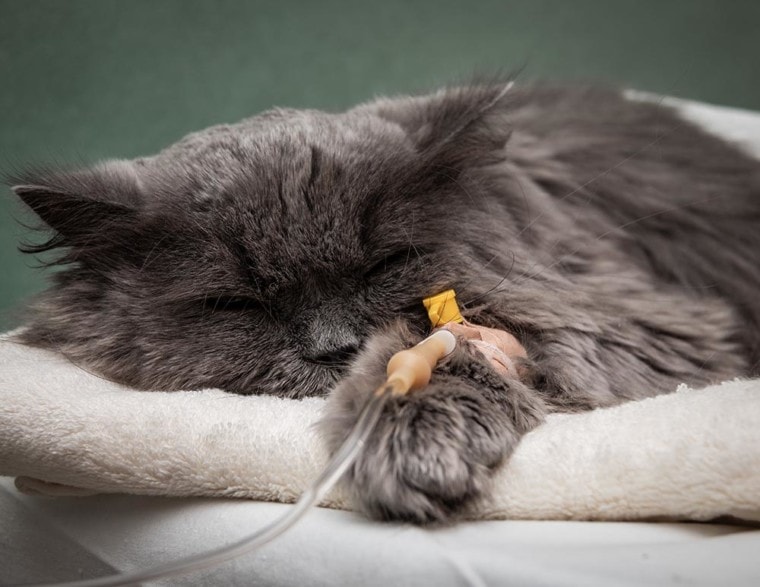
As a cat owner, you probably know your cat’s routine quite well, which is why you may immediately become suspicious if your cat starts to use their litter box a lot more than they usually do.
If they start to have difficulty urinating or have accidents outside of the litter box, there is reason for concern, as they could have a Urinary Tract Infection (UTI). If your cat has had a UTI in the past, it is not unusual for them to have more. However, if your cat keeps getting UTIs, it may be an indication that they may have an underlying health condition.
There are several possible reasons why your cat keeps getting UTIs, including diabetes and bladder stones. However, it’s important that your cat gets examined and diagnosed by their vet so that they can receive the necessary treatment for their condition.
Did you know that UTIs only account for around 10-15% of urinary problems in cats? Feline Lower Urinary Tract Disease (FLUTD) has a number of causes,1 including infection, but the vast majority are due to a condition known as Idiopathic Cystitis. This condition is generally a diagnosis of exclusion, when no other cause for urinary tract problems can be found, and requires different treatment and management strategies to infection, so it is important to have your cat (and their urine!) checked by a vet.
Let’s take a deeper look into UTIs and why they might be reoccurring in your cat.
The Basics of Feline UTIs
A UTI can affect any male or female cat at any stage in their life, but it is much more common in older females, and cats with certain underlying health conditions. It occurs when bacteria make their way up the urethra and into the cat’s bladder. They’re usually diagnosed through a urine sample and, most of the time, are pretty easy to treat.
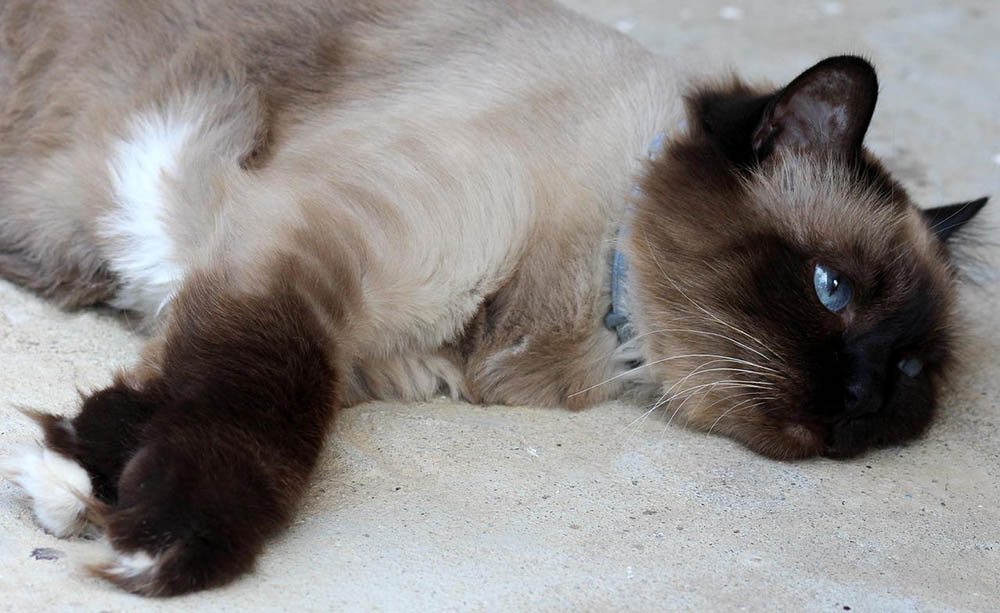
However, UTIs that are left untreated can spread to other parts of the urinary tract and can even be fatal, so it’s important that you take your cat to a vet if you see any of the following symptoms:
Now that you know a bit more about UTIs and what to look out for, let’s discuss the various reasons that could cause them to reoccur.
The 7 Reasons Why Your Cat Keeps Getting UTIs
1. Diabetes Mellitus
UTIs can occur in cats with or without diabetes, but they’re more common in cats with this health condition. Unfortunately, even cats with good diabetic control are at the same risk of getting UTIs as cats with poor diabetic control, so it’s important to look out for this infection regardless of your cat’s diabetic status.
If your cat has diabetes, they may keep getting UTIs because of the excess sugar in their urine. Bacteria love sugar in the urine because it creates an environment in which they can thrive and grow. Cats with diabetes also have a suppressed immune system, so they can’t fight off infections the same way a healthy body could.
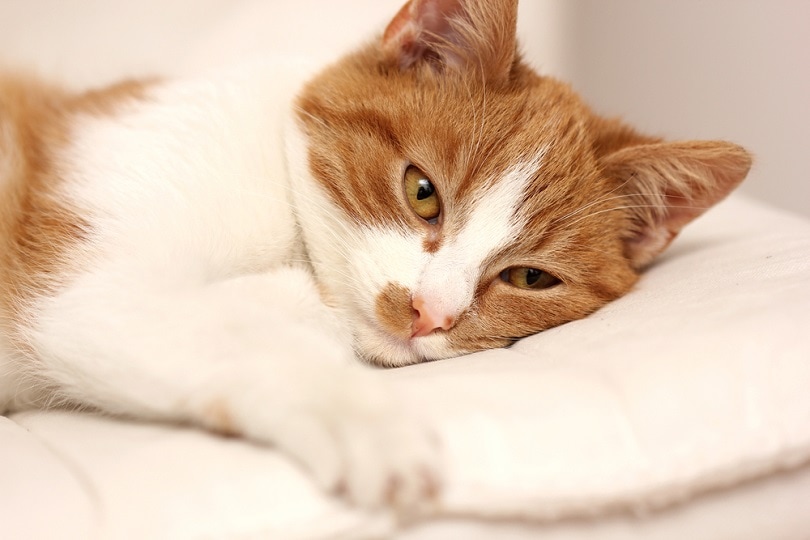
2. Bladder Stones
Bladder stones (aka Uroliths) develop when the minerals in your cat’s body aren’t being processed properly, and crystallize. They can vary in size, shape, and type, and can cause bleeding, inflammation, and damage by rubbing against the wall of your cat’s bladder. They can also l make urinating difficult by causing trauma and swelling inside the urethra.
Urolithiasis presents itself with almost the same symptoms as a UTI, and one can often be mistaken for the other by the owners. However, bladder stones can sometimes become lodged in the urethra, resulting in an obstruction that can be fatal to your cat. Urethral obstruction usually only affects males, due to their s-shaped urethra, and it is a medical emergency.
Bladder stones or crystals that aren’t treated will often result in the recurrence of UTIs.
3. Kidney Stones
We’ve discussed how bladder stones can be a reason for recurrent UTIs in your cat, but kidney stones could be the reason too. Kidney stones can be caused by an excess of calcium in your cat’s urine or blood, dehydration, infections, and a high alkaline urine pH. Bacteria can grow in urine that has more alkaline and less acid, which will result in UTIs.
Your cat’s kidneys filter their blood, removing waste and turning it into urine to be passed through their ureters, to their bladder, and out of their body. However, if kidney stones block the ureter, bacteria can grow because the waste isn’t able to pass through the body.
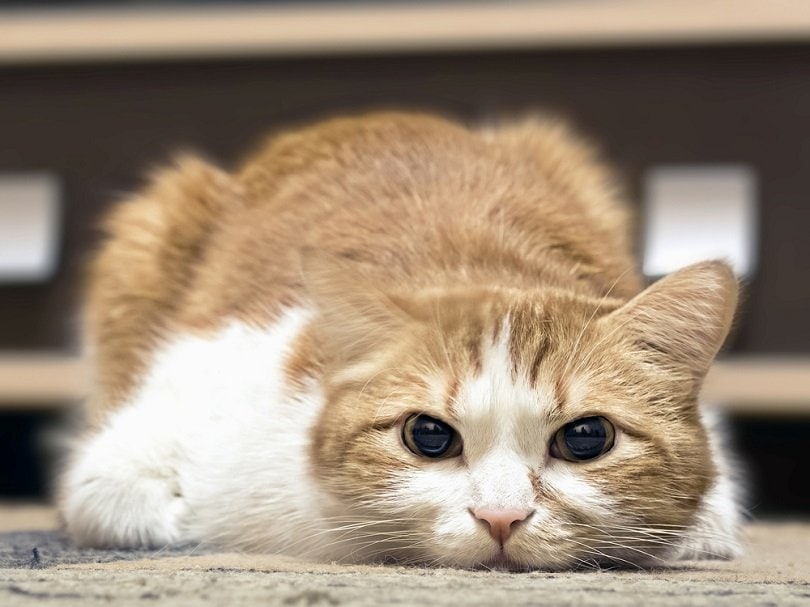
4. Feline Immunodeficiency Virus
Feline Immunodeficiency Virus (FIV) is uncommon but has no cure and is only found in the cat family. The virus is shed through bite wounds and blood. FIV kills white blood cells and weakens the immune system, leaving cats vulnerable to chronic and recurrent infections, such as UTIs.
Because there is no cure for FIV, vets can only treat your cat’s secondary illnesses that are caused by the virus, along with their symptoms. However, they can help keep your cat in good health by providing them with fluid and electrolyte therapy, medication to boost their immune system and reduce inflammation, and a good diet.
It is important to note that FIV can only be spread to other cats, usually through fighting, and CANNOT be transmitted to humans.
5. Obesity
Your cat might be getting UTIs over and over because of their weight. Although cats are excellent groomers and take pride in keeping themselves clean and well-maintained, an obese cat won’t be able to reach all over their body and will fail to groom themself the way they’re supposed to. This is a serious problem because a lack of proper hygiene can lead to UTIs.
Not only does obesity put a strain on your cat’s joints and organs, but it also lowers their quality of life and puts them at risk for serious health problems. Overweight male cats are also at a much higher risk of developing a urethral blockages than their slimmer counterparts. You can change the direction of your cat’s health by encouraging daily exercise and putting them on the correct diet.

6. A Damaged Bladder Wall
Bladder polyps and cancer, as well as bladder inflammation from stress, can cause damage to your cat’s bladder wall. A cat with these health issues could end up with poor bladder health and damaged lining, which makes them vulnerable to bacteria getting in and causing a UTI or recurring UTIs.
Bacteria in your cat’s urine won’t always result in a UTI, especially if they’re healthy because their body will fight against it. However, a compromised bladder is at a higher risk for UTIs.
7. Age
UTIs are commonly seen in senior cats and less common in cats younger than 10 years old. Many older cats have illnesses that can make their bodies susceptible to UTI, but they also have weaker muscles, even around their urinary tract.
Cats with weak bladder muscles will have frequent accidents and will be at a higher risk for recurring UTIs because of their lack of good hygiene. Often older cats have arthritis and other mobility issues that can also contribute to this problem.
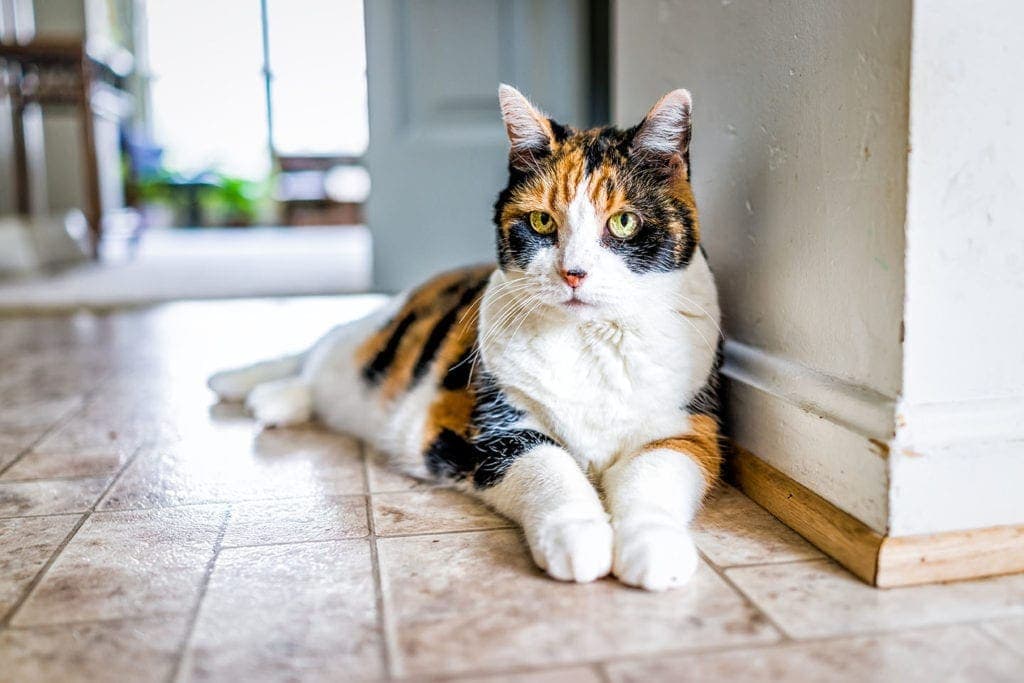
How To Reduce the Risk of UTIs Coming Back
Get Them on The Right Treatment
If your cat has an underlying health problem that is causing your cat’s UTI to recur, it’s important to get them onto the correct treatment from the vet. Although some of these conditions are not curable, most can be well managed with appropriate treatment.
If your cat is on treatment for their condition and still frequently gets UTIs, take them back to the vet because an adjustment in their medication might need to be made. Your vet might also offer a new diet for your cat that is designed to support urinary tract health.
Create a Stress-Free Environment
Long-term stress can weaken your cat’s immune system, which can make them vulnerable to infections. Reduce their stress by placing their litter box in a quiet area of your house, spending more time with them, and giving them more toys to play with. Adding perches on your walls or windows so that they can look out and watch their environment from above can also help them feel more relaxed and secure.
Keep Their Litter Box Clean
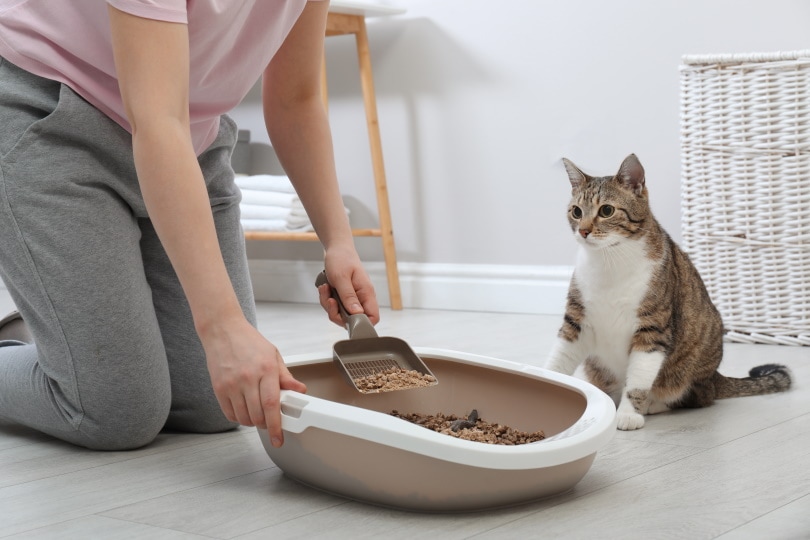
Cats like a clean litter box. If their litter box isn’t cleaned regularly, they may try to hold their urine in for long periods, which can lead to incontinence and a build-up of bacteria, which can lead to UTIs.
If they do use the dirty litter box, they may transfer diseases from their litter box into the house and are at a higher risk for a UTI because they’ll be urinating where a lot of bacteria is present. If you have a couple of cats in your home, get multiple litter boxes so that your cats always have easy access to one or more.
Keep Them Hydrated
Staying hydrated will increase urination, which can flush bacteria out of your cat’s body. If your cat is prone to getting UTIs often—and even if they’re not—encourage hydration by placing water bowls around your home for easy access. Most cats don’t like to drink from water bowls that are kept beside their food bowls, so place their water in a separate area to where they are fed. Drinking fountains are also particularly attractive to cats (and dogs!) because they associate running water with clean water. You can also offer them canned cat food because it has a much higher moisture content than dry cat food.
Conclusion
Your cat might be getting UTIs regularly for several reasons. It could be a symptom of an underlying health condition, or it could be due to old age, poor hygiene, or a damaged bladder wall. Regardless of the cause, UTIs are very uncomfortable and can be painful. Your vet will need to examine and diagnose them with a UTI because there are several health issues that can closely resemble infection.
UTIs left untreated can become more serious, so respond to your cat’s symptoms with urgency. If you’re able, try to collect a urine sample from your kitty prior to your vet visit. Use a clean, dry litter box with some torn paper inside so the urine won’t be absorbed by litter. When it comes to a urine sample, fresh is best! If you can’t get the sample to your vet right away, pop it in the fridge until your appointment. Your vet will love you!
Featured Image Credit: Vladimir Gudvin, Shutterstock







